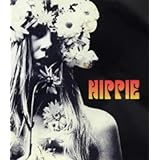
Average Reviews:

(More customer reviews)
Hippie is a glossy coffee table book covering the rise and demise of the counterculture during the years from 1965 to 1971. For those who lived through the era, the full-page photos are bound to get some synapses firing (presumably bypassing all those drug-damaged neural junctions). This is essentially a People magazine version of the sixties: lots of breathless headlines and celebrity photos. Writer Barry Miles has dug up some good music gossip, including not very flattering John Lennon anecdotes.
Some serious issues of the era get raised - Vietnam, civil rights, woman's liberation, gay rights - but in a, well, glossy coffee-table-book way. The editorial difficulty in putting together a book of this sort is deciding whether you're celebrating sex, drugs and rock and roll or chronicling a culture in crisis.
The young people in America rose up in mass revulsion against Jell-O molds and tract homes with bomb shelters in the back yard. They hit the road looking for something more optimistic and more fun. Enormous energy went in to trying to alter or bring down the dominant culture. In the civil rights and antiwar movements, people were literally putting their lives on the line. People's "lifestyle choices," as we now call them, had profound repercussions, personally and politically, in ways unimaginable to young people today (soldiers in Iraq excepted). Similar upheavals were happening in Europe, especially France, where the student - worker alliance only dreamed of in the US actually came to pass in the heady spring of 68.
You can get a good debate going by asking which specific event signified the end of the sixties in America. Was it Kent State, where the Ohio National Guard gunned down four student protesters? Altamont, where the peace and love culture broke down on its own without any outside interference? The breakup of the Beatles? Or, even earlier, Nixon's election in 68, which demonstrated the difficulty of changing hearts and minds in America? Barry Miles covers them all here, so you can make up your own mind.
But America has a genius for absorbing new ideas into its vast, spongy middle. Hippie notions of casual sex, recreational drug use, and quirky personal style seeped into suburban living rooms, stripped of any cultural or political critique. In the 1970s, the revolution was not only televised, but merchandised, and the momentum had for sure crested and started to recede. On the plus side, protests at the Miss America pageant led by a tortuous route to housewives in Sioux Falls filling cubicles at insurance and credit card companies. African Americans got access to academia and began moving up the economic ladder. George W. Bush notwithstanding, we work harder to prevent industries from poisoning our air and water.
But there was a time, my children, when hope hung in the air, and personal liberation was a radiant promise. All you had to do was stare out at the future with the right kind of eyes. Clearly the old structures would topple, and gleaming new edifices of our own making would rise to replace them. The apocalyptic change didn't happen, but whether you were partying or protesting, it was a grand time to be alive. Hippie, for all its slickness, is a great memory jogger for those who participated and not a bad introduction for those who missed out on the Age of Aquarius.
Click Here to see more reviews about: Hippie

0 comments:
Post a Comment